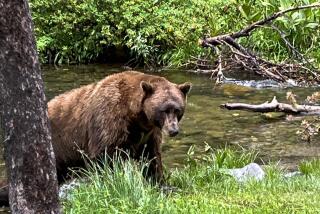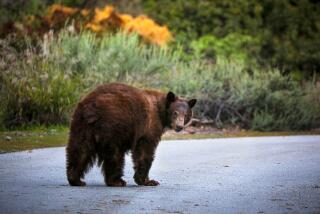Boy’s Bear-Hunt Wish Puts Foundation in Cross Hairs
After 16 years of taking terminally ill children to Disneyland, a Super Bowl game or meetings with sports stars and actors, the Make-A-Wish Foundation was unprepared for what a teenager suffering from a brain tumor wanted most: to shoot a kodiak bear in Alaska.
But it didn’t blink. It turned to Safari Club International, which collected donations, including $4,000, airline tickets, a Weatherby .340-magnum rifle, binoculars, hunting clothing, an outfitter and a taxidermist.
Now, the program that has provided thousands of families with joyful memories to help ease the depression of losing a child is on the hit list of virtually every animal-rights group in the nation.
On Friday, the Humane Society of the United States, the world’s largest animal protection group with 3 million members, asked the foundation to withdraw its offer of a guided trophy bear hunt, and to establish new guidelines barring any wish that could result in cruelty to animals.
“Trophy hunting inflicts needless and undeniable pain, trauma and death on animals for the sake of amusement,” Humane Society Vice President John Grandy said in a letter to the foundation.
Sending the young man to Alaska on “safari” to photograph a kodiak bear “would be a particularly appropriate alternative,” he said.
The same day, the Los Angeles animal rights group Ark Trust Inc. secured an alternative proposal for the boy and his family: a chance to spend a day with actor Pierce Brosnan on the Idaho set of his new James Bond film.
And the Fund for Animals, among the nation’s most aggressive anti-hunting organizations, posted “alerts” about the teenager’s wish on the Internet and in the monthly magazine Bunny Huggers Gazette.
It was all too late.
On Friday, the Minnesota teenager, Erik, whose last name is being withheld by the foundation, was already stalking a bear on the Alaska peninsula with a permit donated by a German hunter, according to Don McMillan, a spokesman for the Safari Club chapter in Minnesota.
“With the help of 20 contributors this boy is now in Alaska taking his bear hunt,” said McMillan, a dentist. “We hope he gets one.”
“That’s too bad,” said Gretchen Wyler, president of Ark Trust, which has worked closely with the foundation over the years.
“It’s a perverse, chilling twist on the phrase ‘death wish,’ ” Wyler said. “It’s amazing to think that someone whose life is about to end chose to extinguish the life of a kodiak bear, the largest land carnivore in North America.”
“The foundation will never be able to sustain the damage this will do to their image, especially in the Hollywood community,” she added. “They will rue the day they ever let the Safari Club be a partner.”
James E. Gordon, president of the Phoenix-based Make-A-Wish Foundation, declined to be interviewed. But in a prepared statement, he said the foundation, which has helped 38,000 youngsters, “grants wishes to children up to 18 years of age who have life-threatening illnesses. Our wishes are limited only by the child’s imagination, and often reflect the activities and way of life to which the child is accustomed.
“The wish of a Minnesota boy to hunt kodiak bear in Alaska has been approved by the board of directors of our Minnesota chapter. It is the sincere wish of the youngster and reflects a lifelong involvement in family fishing and hunting trips.”
Steve Wells of the Alaska Wildlife Alliance, however, said hunting bears in Alaska in the spring is troubling because it jeopardizes females with cubs.
“The problem is that sows, which are almost impossible to tell apart from males, come out of their winter dens before their cubs,” Wells said. “When they are shot the cubs are orphaned.”
For this reason, he said, “Spring bear hunting is banned in many states. But in Alaska it remains legal and the adverse impacts of the practice are not being addressed.”
Ron Marlenee, a lobbyist for Safari Club International and a former congressman from Montana, said that the Alaska brown bear is the most carefully managed species in the nation.
“When hunters and non-hunters alike go out to see wildlife, whether it be deer, moose, Rocky Mountain elk, birds or anything else,” he said, “those animals are there because sportsmen put up the dollars to protect them and their habitat. All animal rights activists have ever done is bitch and create controversy.”
But Humane Society spokesman Wayne Pacelle said the debate is not about “who pays for conservation. This is about a reputable charity organization that has granted a wish that will result in cruelty to animals, and that is entirely inappropriate.”
Wyler agreed.
“It’s sad enough that this young man is going to die. It compounds the sadness that he wants something else to die,” she said.
Times staff writer Bob Pool from Los Angeles contributed to this story.
More to Read
Sign up for Essential California
The most important California stories and recommendations in your inbox every morning.
You may occasionally receive promotional content from the Los Angeles Times.











